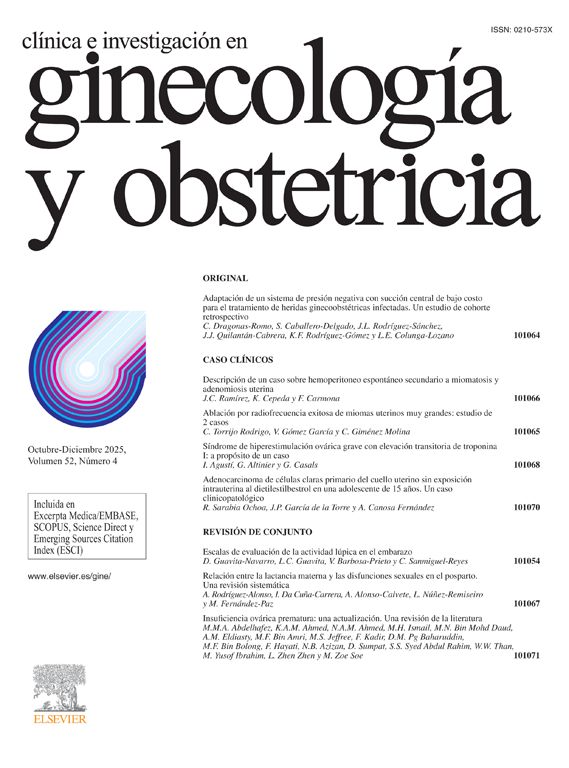Advanced maternal age is associated with a greater number of obstetric complications and adverse perinatal outcomes. It is increasingly common to find pregnant women over 45 years of age and even over 50. There are few studies that evaluate perinatal outcomes at extreme ages, over 45 years of age. Therefore, the objective of this study is to explore perinatal outcomes in the pregnancies of women over 45, as well as to compare twin and singleton pregnancies in this population.
Material and methodsAn observational retrospective case–control study was carried in the Obstetrics and Gynecology Department of University Hospital La Paz (Madrid, Spain) between January 2017 and June 2023. All twin pregnancies of mother over 45 at the time of delivery as cases (n=22) and 3 controls for each case (n=65) were included. Perinatal outcomes were assessed and compared between singleton pregnancies and twins.
ResultsThe frequency of preeclampsia was statistically higher in the twin group (27.3% vs 7.7%; p=0.017) (OR 4.5 (1.21–16.65)). Cesarean section was significant more frequent in the twin group (90.9% vs 49.2%; p=0.001) (OR 10.31 (2.23–47.75)). In twins, prematurity rate (68.2% vs 17.2%; p<0.001) and admission to neonatal ICU (63.6% vs 14.5%; p<0.001) were increased. No differences were found in gestational diabetes, pregnancy-induced hypertension, small for gestational age, Apgar test<7 at 5min or in the pH<7.10 in cord blood at birth.
ConclusionsAdvanced maternal age is an independent risk factor for adverse perinatal outcomes and obstetric complications, independently of the number of fetuses, especially at extreme fertile ages above 45 years. In the case of twin gestations, risks inherent to twins also increase, such as prematurity, admission to the NICU and CS.
La edad materna avanzada se asocia con un mayor número de complicaciones obstétricas y resultados perinatales adversos. Cada vez es más común encontrar mujeres embarazadas mayores de 45 años e incluso mayores de 50. Existen pocos estudios que evalúen los resultados perinatales en edades extremas, mayores de 45 años. Por tanto, el objetivo de este estudio es explorar los resultados perinatales en los embarazos de mujeres mayores de 45 años, así como comparar los embarazos gemelares y únicos en esta población.
Material y métodosSe realizó un estudio observacional retrospectivo de casos y controles en el Servicio de Obstetricia y Ginecología del Hospital Universitario La Paz (Madrid, España) entre enero de 2017 y junio de 2023. Se consideraron casos todos los embarazos gemelares de madre mayor de 45 años en el momento del parto. (n=22) y 3 controles para cada caso (n=65). Se evaluaron y compararon los resultados perinatales entre embarazos únicos y gemelares.
ResultadosLa frecuencia de preeclampsia fue estadísticamente mayor en el grupo de gemelos (27,3% vs 7,7%, p=0,017) (OR 4,5 (1,21-16,65)). La cesárea fue significativamente más frecuente en el grupo de gemelos (90,9%, vs 49,2%; p=0,001) (OR 10,31 (2,23-47,75)). En gemelos, la tasa de prematuridad (68,2% vs 17,2% p<0,001) y de ingreso a UCI neonatal (63,6% vs 14,5% p<0,001) fueron mayores. No se encontraron diferencias en diabetes gestacional, hipertensión inducida por el embarazo, tamaño pequeño para la edad gestacional, test de Apgar <7 a los 5 minutos ni en el pH <7,10 en sangre de cordón al nacer.
ConclusionesLa edad materna avanzada es un factor de riesgo independiente de resultados perinatales adversos y complicaciones obstétricas, independientemente del número de fetos, especialmente en edades fértiles extremas superiores a los 45 años. En el caso de las gestaciones gemelares también aumentan los riesgos inherentes a los gemelos, como la prematuridad, el ingreso a la UCIN y la cesárea.









